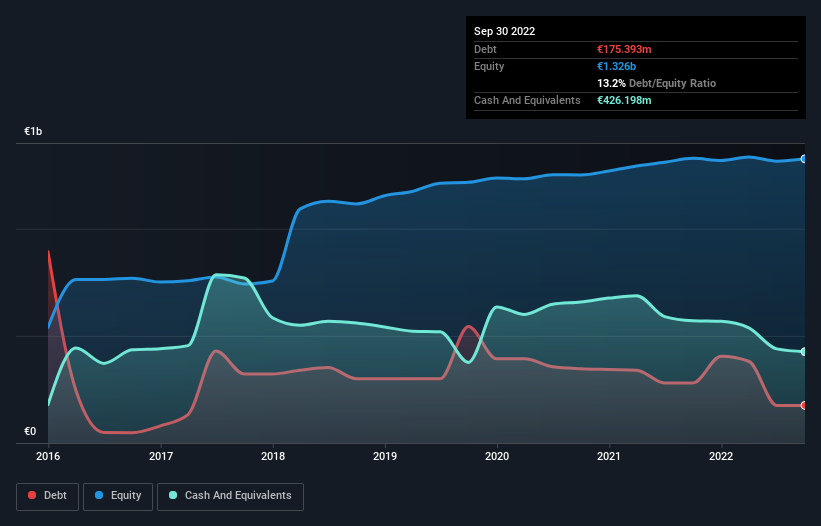- Germany
- /
- Real Estate
- /
- XTRA:PAT
These 4 Measures Indicate That PATRIZIA (ETR:PAT) Is Using Debt Reasonably Well
Some say volatility, rather than debt, is the best way to think about risk as an investor, but Warren Buffett famously said that 'Volatility is far from synonymous with risk.' So it might be obvious that you need to consider debt, when you think about how risky any given stock is, because too much debt can sink a company. We note that PATRIZIA SE (ETR:PAT) does have debt on its balance sheet. But the more important question is: how much risk is that debt creating?
What Risk Does Debt Bring?
Debt and other liabilities become risky for a business when it cannot easily fulfill those obligations, either with free cash flow or by raising capital at an attractive price. If things get really bad, the lenders can take control of the business. However, a more common (but still painful) scenario is that it has to raise new equity capital at a low price, thus permanently diluting shareholders. Having said that, the most common situation is where a company manages its debt reasonably well - and to its own advantage. The first step when considering a company's debt levels is to consider its cash and debt together.
Check out the opportunities and risks within the DE Real Estate industry.
How Much Debt Does PATRIZIA Carry?
As you can see below, PATRIZIA had €175.4m of debt at September 2022, down from €280.1m a year prior. However, its balance sheet shows it holds €426.2m in cash, so it actually has €250.8m net cash.

How Strong Is PATRIZIA's Balance Sheet?
The latest balance sheet data shows that PATRIZIA had liabilities of €151.2m due within a year, and liabilities of €474.0m falling due after that. Offsetting this, it had €426.2m in cash and €217.8m in receivables that were due within 12 months. So it can boast €18.8m more liquid assets than total liabilities.
This surplus suggests that PATRIZIA has a conservative balance sheet, and could probably eliminate its debt without much difficulty. Simply put, the fact that PATRIZIA has more cash than debt is arguably a good indication that it can manage its debt safely.
Shareholders should be aware that PATRIZIA's EBIT was down 65% last year. If that earnings trend continues then paying off its debt will be about as easy as herding cats on to a roller coaster. When analysing debt levels, the balance sheet is the obvious place to start. But ultimately the future profitability of the business will decide if PATRIZIA can strengthen its balance sheet over time. So if you want to see what the professionals think, you might find this free report on analyst profit forecasts to be interesting.
Finally, while the tax-man may adore accounting profits, lenders only accept cold hard cash. While PATRIZIA has net cash on its balance sheet, it's still worth taking a look at its ability to convert earnings before interest and tax (EBIT) to free cash flow, to help us understand how quickly it is building (or eroding) that cash balance. Over the last three years, PATRIZIA actually produced more free cash flow than EBIT. That sort of strong cash generation warms our hearts like a puppy in a bumblebee suit.
Summing Up
While we empathize with investors who find debt concerning, you should keep in mind that PATRIZIA has net cash of €250.8m, as well as more liquid assets than liabilities. And it impressed us with free cash flow of €88m, being 144% of its EBIT. So we are not troubled with PATRIZIA's debt use. When analysing debt levels, the balance sheet is the obvious place to start. However, not all investment risk resides within the balance sheet - far from it. For instance, we've identified 3 warning signs for PATRIZIA that you should be aware of.
Of course, if you're the type of investor who prefers buying stocks without the burden of debt, then don't hesitate to discover our exclusive list of net cash growth stocks, today.
New: Manage All Your Stock Portfolios in One Place
We've created the ultimate portfolio companion for stock investors, and it's free.
• Connect an unlimited number of Portfolios and see your total in one currency
• Be alerted to new Warning Signs or Risks via email or mobile
• Track the Fair Value of your stocks
Have feedback on this article? Concerned about the content? Get in touch with us directly. Alternatively, email editorial-team (at) simplywallst.com.
This article by Simply Wall St is general in nature. We provide commentary based on historical data and analyst forecasts only using an unbiased methodology and our articles are not intended to be financial advice. It does not constitute a recommendation to buy or sell any stock, and does not take account of your objectives, or your financial situation. We aim to bring you long-term focused analysis driven by fundamental data. Note that our analysis may not factor in the latest price-sensitive company announcements or qualitative material. Simply Wall St has no position in any stocks mentioned.
About XTRA:PAT
PATRIZIA
PATRIZIA has been providing investment opportunities in smart real assets for institutional, semi-professional, and private investors for more than 40 years, focusing on real estate and infrastructure.
Mediocre balance sheet second-rate dividend payer.
Similar Companies
Market Insights
Community Narratives



